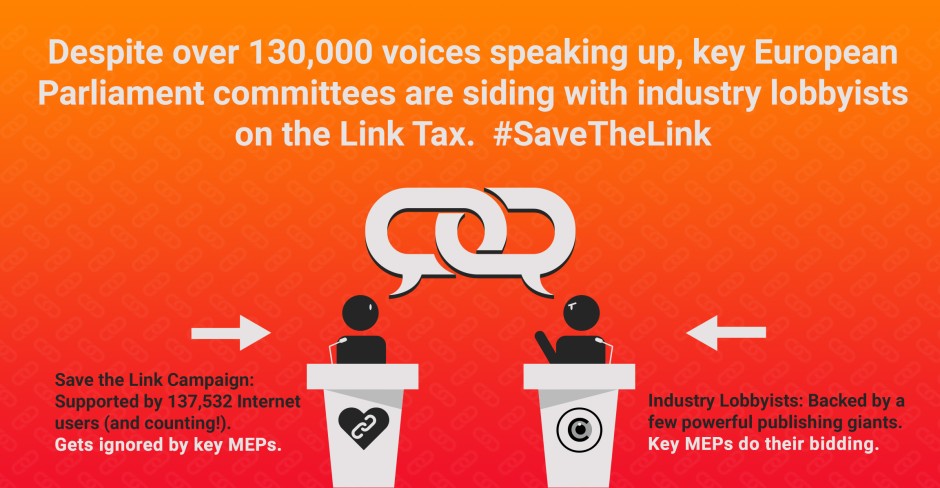MEPs vote in favour of dangerous censorship proposals
On 11th July, key EU committees made their final call on copyright law & failed to save the link
This week in European Parliament has has been disappointing one for the right to link.
In the last few weeks many committees have been debating and voting on the proposals for a link tax, content filtering and more — a right for user generated content, more uses of copyright for education, and freedom of panorama are all up on the table — in the EU’s major copyright reform package.
On 11th July, the Culture Committee and the Industry committee made their final voteto say what they will present as their vision for the law.
Here’s the bad news: this is the pinnacle of terrible copyright votes.
It was grim to watch as they both voted to endorse the link tax AND censorship machinery.
The details are particularly unsettling.
Even though academics have resoundingly condemned the link tax, the Industry committee voted to expand the link tax to scholarly journals as well as news links!
Teachers and professors have been speaking out that what they want is copyright that works for education, but it is the big publishers, controlling access to knowledge, who are being listened to.
This new plan would make open access publishing virtually impossible, and would undoubtedly put a chilling effect on the spread of research, news and knowledge.
Remember, this is an idea that Internet users don’t want; academics have resoundingly said is unworkable; those living under existing versions of the law hate; and MEPs voted not to include right in the beginning of this proposal.
The Culture Committee’s version of the link tax also removes the word “digital” from “digital use of their press publications”, but no one has explained how they intend to collect fees for using headlines in print! It seems highly likely to hit museums and libraries and any archive institutions — where old news records are kept — gutting public interest bodies already short of funds, and harming research.
They tried to pay lip service to members of the public, who overwhelmingly don’t want this law, by saying that we won’t be charged for ‘non-commercial uses’ of links.
It’s often claimed that consumers are protected by adding a “non-commercial” exception clause — but when our posts, links and comments are on profit-making platforms it still ends up being commercial. For example, posts we make on Facebook and Twitter where there are ads are still commercial by many definitions. The clause is rendered meaningless.
As with many of these laws the final implementation will be decided by the people with the money to hire the best lawyers. If our legislators truly want to protect the public interest, they need to make specific and explicit exceptions to do so — and these proposals don’t even attempt to find that balance.
When it comes to upload filtering, the Culture Committee’s vote runs counter to their own proposal from just a few months ago.
These Culture Committee MEPs already voted to prohibit content filtering in the name of terrorism in the audio-visual directive. Members were opposed to default network filters, voting against installing them to block terrorist and extremist content and online hate.
It makes no sense whatsoever that there should be stricter controls to limit what we do on the web in order to police for potential copyright infringement than there are for spreading terrorist propaganda, or harassment (see EDRi’s blog post ). It seems the copyright lobby has way more power than victims of hate crime.
The committee also voted to support the idea that these rules should apply to services that just store content. This policy would affect any cloud storage service for music or video, even if legally acquired, which could mean that we see filters blocking us from storing the things we’ve paid for!
If there was any bright spot in the committee vote, it would be that they expressed support for a “user generated content (UCG) exception” which is intended to encourage online art and bring Europe towards the idea of ‘fair use’ that so many other countries have. However, support for a UCG exception, while simultaneously pushing content filters is an unworkable contradiction.
Instead of truly looking out for users and the public interest, it looks as though MEPs are trying to show that they’re listening to different groups — but what we’re left with is a mess, rather than a useful, practical law.
We’ve come a long way from the European Parliament’s original stance, and a long way from the tens of thousands of people who engaged in good faith in public consultation on these issues.
The positive is that neither of these votes are binding for the European Parliament. The “legal affairs” (JURI) committee has to listen to all other committee views, but theirs is the final call, and their vote won’t happen until October.
Now that we’ve seen how susceptible MEPs are to the lobbying of Big Publishers, we have to push even harder than before to make sure the final vote puts a stop to content filtering and the link tax once and for all.
Let's show these MEPs that they have to do the right thing. Make as much noise as possible to show that you are paying attention!



 Take action now!
Take action now!
 Sign up to be in the loop
Sign up to be in the loop
 Donate to support our work
Donate to support our work